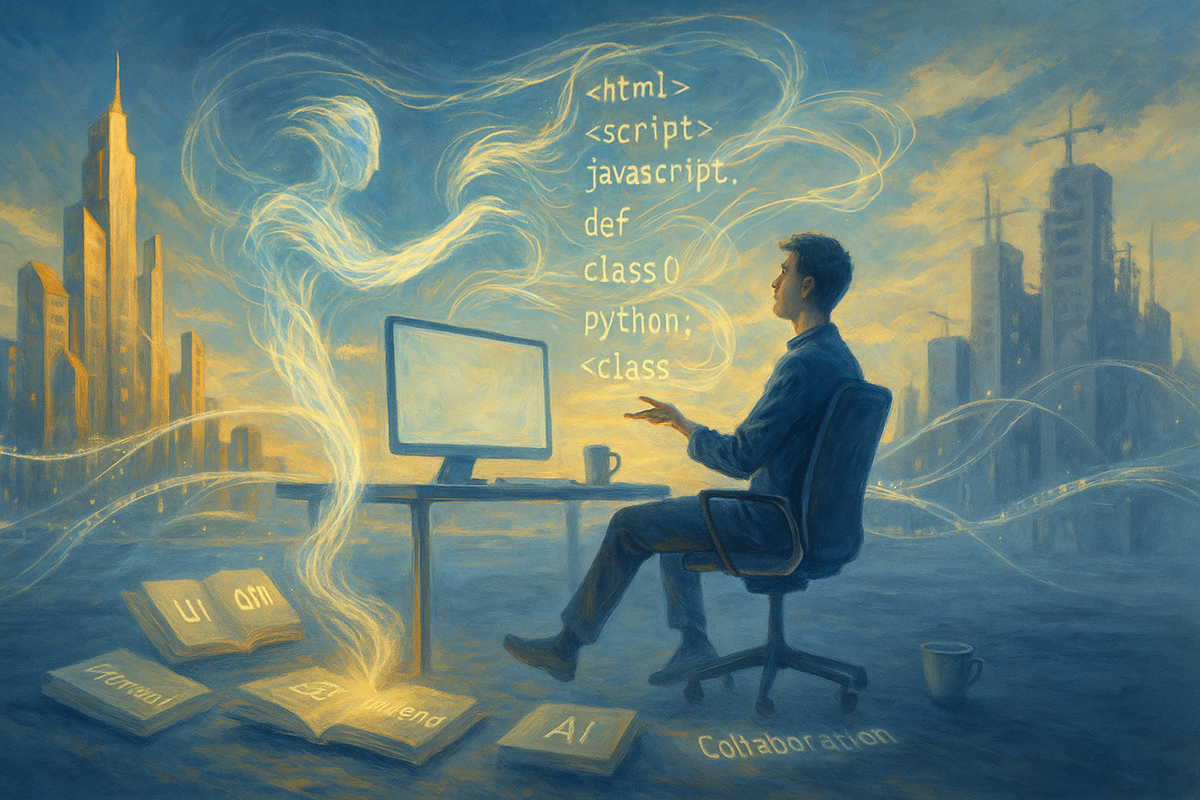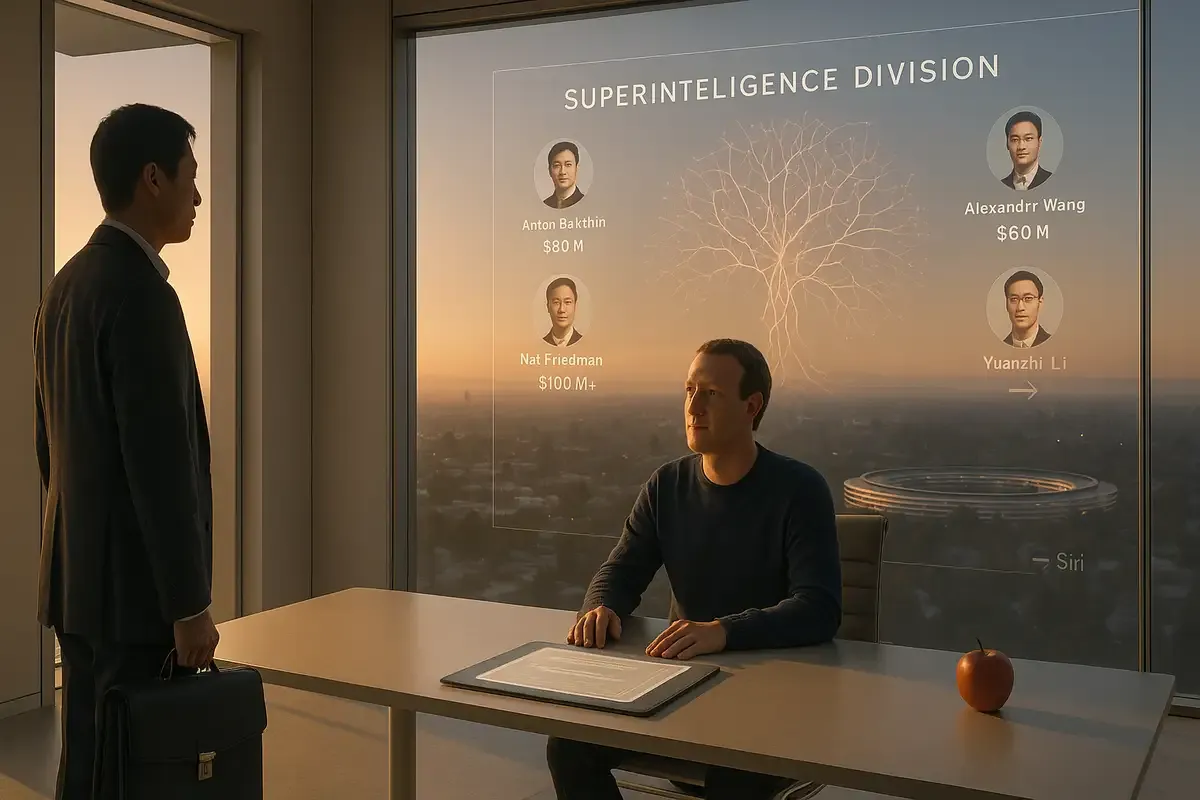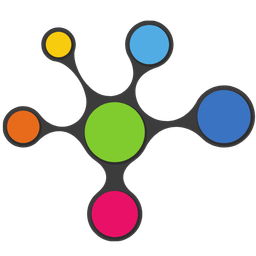💡 TL;DR - The 30 Seconds Version
👉 Meta hires Ruoming Pang, Apple's foundation models chief, with a package worth tens of millions annually as part of Zuckerberg's AI talent raid.
📊 Pang led Apple's 100-person team that built the AI models powering Apple Intelligence features like email summaries and Genmoji.
🏭 Meta restructured its AI efforts in June around "superintelligence" and has hired researchers from OpenAI, Anthropic, and Scale AI.
🍎 Apple has been debating whether to outsource Siri to OpenAI or Anthropic instead of using internal models, hurting team morale.
🚪 More departures from Apple's AI team are expected, with several engineers considering offers from Meta and other companies.
🌍 The AI talent war has become zero-sum, with companies offering $100 million packages to secure top researchers.
Apple just lost its most important AI executive to Meta. Ruoming Pang, who ran Apple's 100-person foundation models team, jumped ship for a deal worth tens of millions per year.
The move stings. Pang built the large language models that power Apple Intelligence - everything from email summaries to those Genmoji characters. He joined Apple from Google in 2021 and became the architect behind Apple's AI push.
Meta confirmed the hire Monday. Apple stayed silent.
The Talent War Gets Personal
Mark Zuckerberg has turned AI recruitment into a contact sport. He hosts potential hires at his Silicon Valley and Lake Tahoe homes. He calls them directly. And he writes checks that make other companies wince.
Meta just reorganized its AI efforts under a new "superintelligence" division. The goal: build AI that matches or beats human performance. Zuckerberg hired Scale AI's CEO Alexandr Wang to run it after investing in his company at a $29 billion valuation.
The shopping spree continues. Meta grabbed researchers from OpenAI, including Yuanzhi Li. It hired Anton Bakhtin from Anthropic, the company behind Claude. Former GitHub CEO Nat Friedman joined. So did startup founder Daniel Gross.
Some packages reach $100 million. The message is clear: Meta will pay whatever it takes.
Apple's AI Struggles Come to Light
The timing makes this worse for Apple. The company has been debating whether to use its own AI models or outsource to OpenAI and Anthropic for a new version of Siri. Those discussions have soured morale on Pang's team.
Apple promised an AI-powered Siri in mid-2024. It still hasn't shipped because the internal version doesn't meet quality standards, executives say. The delays led to a reshuffling of AI leadership earlier this year.
John Giannandrea, Apple's AI chief, got sidelined. He lost control of Siri, robotics, and other consumer teams. Craig Federighi, head of software, now runs Apple's AI strategy along with Mike Rockwell, who built Vision Pro.
Pang's departure could start an exodus. Several engineers on his team are considering offers from Meta and others, sources say. Tom Gunter, Pang's top deputy, already left last month.
The Foundation Models Team Rebuilds
Apple will reorganize Pang's team under Zhifeng Chen. Instead of engineers reporting directly to one leader, the new structure adds management layers. Chong Wang, Zirui Wang, Chung-Cheng Chiu, and Guoli Yin could become managers.
The team's work touches everything Apple calls intelligent. They built the models behind Priority Notifications, which sort your alerts by importance. They power the writing tools that proofread your emails. They make Genmoji possible.
At Apple's developer conference in June, Pang celebrated his team's progress on LinkedIn. "I'm very excited about the progress we have made since last year," he wrote. He thanked his team and collaborators, calling it "a true privilege."
That enthusiasm didn't last long.
Meta's Superintelligence Bet
Zuckerberg restructured Meta's AI teams in June around the superintelligence concept. The company will spend tens of billions this year on AI infrastructure - data centers, chips, and now talent.
Meta's previous AI efforts haven't impressed. The latest Llama models launched in April to little fanfare. The company delayed a bigger version, sparking internal concerns about direction.
The superintelligence lab represents a reset. Wang brings credibility from Scale AI, which helps train AI models for major companies. The new hires bring expertise from the companies currently leading AI development.
Pang adds something different: experience building AI that actually ships to consumers. Apple Intelligence reaches millions of devices. Meta's AI features still feel experimental by comparison.
Apple's Partnership Strategy
Apple took a different approach at its developer conference. Instead of showcasing purely internal AI, it highlighted partnerships. OpenAI integration powers some ChatGPT features. Google provides others. Even Apple's new Xcode editor taps Claude and ChatGPT for code completion.
This strategy makes sense given Apple's struggles. Why reinvent AI when others have already solved hard problems? But it also signals that Apple's internal efforts aren't ready for prime time.
The foundation models team was supposed to change that. Pang's group was building Apple's answer to ChatGPT and Claude. Now that effort loses its leader and possibly more team members.
The Broader AI Arms Race
Every major tech company faces the same challenge: hire fast or fall behind. The number of people who truly understand large language models remains small. Companies are bidding up salaries to absurd levels.
Meta can afford this better than most. Its advertising business prints money. Apple has deeper pockets but moves more carefully with compensation. Google faces budget pressures. Startups offer equity that might never pay off.
The result is a talent concentration among a few players. Meta, OpenAI, and Anthropic are vacuuming up the best researchers. Apple, Google, and Microsoft are fighting to keep their teams intact.
This creates a feedback loop. Companies with the best talent build better AI, which attracts more talent, which helps them build even better AI.
What Comes Next
Apple faces a choice. It can double down on internal AI development, accepting that it will cost more and take longer. Or it can embrace partnerships while building complementary strengths.
The company's recent moves suggest the latter. Apple excels at user experience, privacy, and device integration. It might not need to build the best language models if it can integrate others' models beautifully.
Meta's bet is different. Zuckerberg believes superintelligence will reshape computing entirely. He wants to own that transition, not depend on others for the core technology.
Both strategies have merit. Apple succeeded for decades by controlling the full experience. Meta built its business by making others' content more engaging.
Why this matters:
• The AI talent war is becoming a zero-sum game where losing key people means falling behind competitors who can pay absurd sums.
• Apple's willingness to use outside AI suggests it knows building competitive models internally is harder and more expensive than expected.
❓ Frequently Asked Questions
Q: What exactly is Apple Intelligence and what can it do?
A: Apple Intelligence is Apple's AI system that powers features like email summaries, Priority Notifications that sort alerts by importance, Genmoji custom emoji creation, and writing tools that proofread text. It runs on iPhones and iPads using models built by Pang's team.
Q: How much is Meta spending total on AI talent this year?
A: Meta will spend tens of billions on AI efforts in 2025, though most goes to infrastructure like data centers and chips. Individual talent packages reach $100 million for top researchers, with Pang getting tens of millions annually.
Q: What is "superintelligence" that Meta is trying to build?
A: Superintelligence refers to AI systems that can complete tasks as well as or better than humans. Meta reorganized its AI teams in June around this goal, believing it will reshape computing entirely rather than just improve existing products.
Q: When will Apple's promised AI-powered Siri actually launch?
A: Apple promised an AI Siri in mid-2024 but still hasn't shipped it. Executives say the internal version doesn't meet quality standards. The company is now considering using OpenAI or Anthropic models instead of its own.
Q: How big is Apple's AI team compared to other companies?
A: Pang led about 100 engineers on Apple's foundation models team. Meta's new superintelligence lab has hired 11 researchers just in recent weeks. OpenAI and Google have hundreds of AI researchers each, giving them larger teams than Apple.
Q: What other companies are losing top AI talent to Meta?
A: Meta hired researchers from OpenAI (including Yuanzhi Li), Anthropic (Anton Bakhtin), and Scale AI (CEO Alexandr Wang). It also recruited former GitHub CEO Nat Friedman and startup founder Daniel Gross. No major AI company appears safe from Meta's recruiting.
Q: Who else has left Apple's AI team recently?
A: Tom Gunter, Pang's top deputy, left Apple last month. Several other engineers on the foundation models team are considering offers from Meta and other companies, suggesting more departures could follow Pang's exit.
Q: How does Apple's AI compensation compare to Meta's offers?
A: Meta offers significantly more than Apple pays engineers doing similar work. While Apple moves carefully with compensation, Meta is offering packages worth tens of millions annually and up to $100 million for some top researchers.











